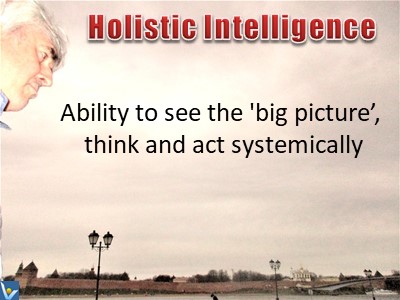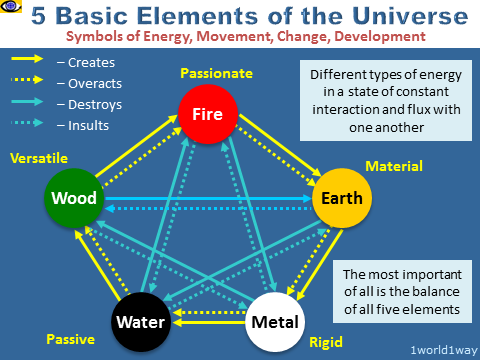|
| |
Holistic
Thinking Defined
Holistic
thinking is
the ability to see things as a whole (or holistically),
to understand and predict the many different
types of relationships between the many elements in a complex
system, and
also
perceive the
whole picture through sensing its large-scale patterns.
|
|
 |
| |
|
Chinese
Wisdom
The Five Basic Elements are Fire, Earth, Water, Metal, and Wood.
|
|
|
 |
These elements are understood as different
types of energy in a state of constant interaction and flux with one
another.
The Five Elements also mean Movement, Change, and Development.
They are changing, moving, waning, and expanding all the time.
|
| |
Searching for Balance
The most important of all is the
balance of all five elements.
The movements of five elements are stable and predictable when they are in
balance, and vice versa.
|
When you are in a stable five-element
environment, and everything is under control, you live peacefully and feel
lucky. When you are in an unpredictable environment, you feel bad luck and
are easily out of control.
Bring your five elements into balance if you want
to be a lucky person. |
|
|
| |
Relationships
Between Five Elements
There are affinity and enmity relationships
between five elements.
The affinity relationship means generating,
supporting, helping, producing, etc.
The enmity relationship means destroying,
overcoming, etc.
There are also two cycles of imbalance, an
overacting cycle and an insulting cycle. |
| |
Affinity Relationships
|
Enmity Relationships |
| |
Water can help tree (Wood) grow
Wood can help Fire to burn
Fire can help to produce dust (Earth)
Earth can help mineral (Metal) to form
Metal can hold Water
Example |
Water quenches Fire
Fire melts Metal
Metal chops Wood
Wood parts Earth
Earth absorbs Water
Example |
|
|